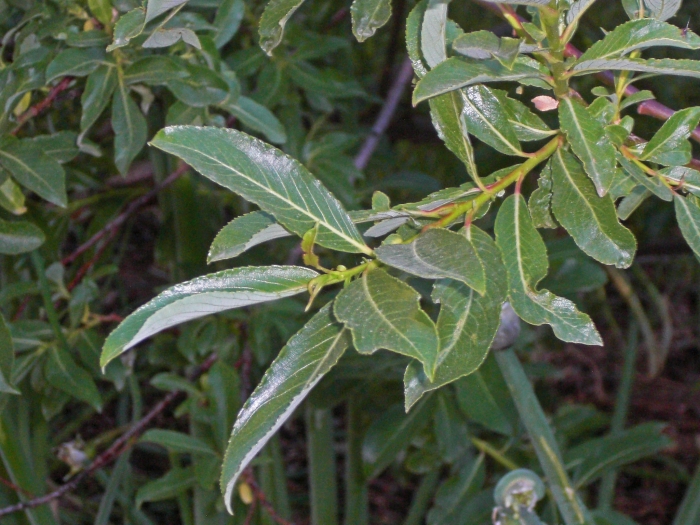Black Pussy Willow
(Salix melanostachys)
Black Pussy Willow (Salix melanostachys)
/
/

Andrey Zharkikh
CC BY 2.0
Image By:
Andrey Zharkikh
Recorded By:
Copyright:
CC BY 2.0
Copyright Notice:
Photo by: Andrey Zharkikh | License Type: CC BY 2.0 | License URL: https://creativecommons.org/licenses/by/2.0/ | Uploader: AndreyZharkikh | Publisher: Flickr |


























Estimated Native Range
Summary
Salix melanostachys, commonly known as Black Pussy Willow, is a deciduous shrub native to wetlands and along streams in Japan. It typically grows to a height and width of 6-10 feet (1.8-3 meters). This species is notable for its catkins, which are covered in black or dark purple scales with contrasting red anthers that appear in early spring before the leaves, adding early-season interest to the garden. The catkins are followed by narrow, lance-shaped leaves. Black Pussy Willow is valued for its unique catkins that are often used in floral arrangements and for its ability to thrive in moist conditions.
Black Pussy Willow is appreciated for its ease of cultivation and its striking catkins, which can be a highlight in winter and early spring gardens. It is suitable for wet garden areas, rain gardens, and alongside ponds or streams. It can tolerate a range of soil types but prefers consistently moist, well-drained soils. It is also adaptable to full sun or part shade. While it has no major pest or disease issues, occasional problems with willow beetle or caterpillars may occur. Pruning should be done in late winter or early spring to promote healthy growth and maintain the desired shape. It has earned the Royal Horticultural Society’s Award of Garden Merit, indicating its exceptional qualities in garden use.CC BY-SA 4.0
Black Pussy Willow is appreciated for its ease of cultivation and its striking catkins, which can be a highlight in winter and early spring gardens. It is suitable for wet garden areas, rain gardens, and alongside ponds or streams. It can tolerate a range of soil types but prefers consistently moist, well-drained soils. It is also adaptable to full sun or part shade. While it has no major pest or disease issues, occasional problems with willow beetle or caterpillars may occur. Pruning should be done in late winter or early spring to promote healthy growth and maintain the desired shape. It has earned the Royal Horticultural Society’s Award of Garden Merit, indicating its exceptional qualities in garden use.CC BY-SA 4.0
Plant Description
- Plant Type: Shrub
- Height: 6-10 feet
- Width: 6-10 feet
- Growth Rate: Moderate
- Flower Color: N/A
- Flowering Season: Spring
- Leaf Retention: Deciduous
Growth Requirements
- Sun: Full Sun, Part Shade
- Water: Medium
- Drainage: Slow, Medium
Common Uses
Bee Garden, Bird Garden, Butterfly Garden, Deer Resistant, Low Maintenance, Salt Tolerant
Natural Habitat
Native to wetlands and along streams in Japan
Other Names
Common Names:
Scientific Names: , Salix melanostachys, Salix gracilistyla var. melanostachys, Salix gracilistyla f. melanostachys, Salix thunbergiana, Salix thunbergiana subsp. melanostachys, Salix nigrolepis,
GBIF Accepted Name: Salix gracilistyla var. melanostachys (Makino) C.K.Schneid.